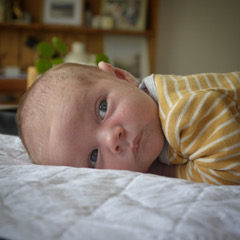We chose to have a home birth and it was the best decision we ever made. My due date came and went as it does for so many other expectant mothers.
At 41+2 weeks I woke at about 5am with period like cramping. They were coming in waves, not overly regular but enough to make me wonder whether this could be the very early stages of labour. They continued throughout the day, still irregular and bearable and by the afternoon they had petered off and lengthened out to fifteen minute plus intervals. My midwife came around to check in at 6pm, she had a feel and a listen to the baby and said it was now fully engaged and was doing everything perfectly, but we might be in this for a while and should try and get some sleep and she’d check back in in the morning, unless things really picked up.
I couldn’t sleep at all. I was so uncomfortable lying horizontally and had really bad reflux. The contractions were a lot stronger now and I needed Johno’s support to get through them. They were lasting over a minute and I found that equated to three long breaths in and out during the peak. The Fraya app helped me with this, and Johno pushed on acupressure points on my shoulders and that reeeaaally helped.
By midnight I couldn’t stand being in bed anymore, so we got up and I paced around the kitchen, knelt and sat on my fit ball and worked through the surges that way, still with Johno’s support. By this stage they were intense. At 1am we filled up the birth pool and I got in, it felt so good. The warm water, the soft, blow up sides, the weightlessness that enabled me to move freely. It was still just the two of us, and we intimately worked through every surge together without really knowing how progressed we were. At around 2am I felt a small gush at the end of a surge and realised my waters had broken. That’s when we called our midwife.
There was still no sense of urgency, and we were probably a little naive as to how quickly and well things were progressing, which in hindsight likely aided the progression, rather than hindered it. Our midwife arrived at around 3am and I vaguely remember her presence entering the room, but she took a backseat and let Johno and I continue to work through each surge together. She did, however, check the baby and note that it was moving down seamlessly and very relaxed. She called our other midwife as she recognised that things were progressing quicker than any of us had anticipated. At one point I heard her whisper to Johno ‘Molly will be pushing soon’, and I felt such relief knowing I would soon be entering the pushing stage and we would meet our baby. She didn’t need to give me a cervical examination to check my dilation to know this – she knew from the sounds I was making, the way I was moving and the intensity of what I was feeling and expressing. I was labouring in the way my body was intended to.
Our second midwife arrived shortly after and it was around this time I felt a shift in the sensations I was experiencing. The intensity of the contractions moved from front, period-like pressure to a need to push, or bear down. I heard the sounds I was making change from a moan to a deep, primal grunt. It wasn’t painful, just an immense amount of pressure that would leave me exhausted and shaking at the end of each one. I have no recollection of time; I had fully surrendered to the process.
Both my midwives got more involved during the pushing stage for which I was so grateful. They coached me through various parts and helped me relax and embrace the process. When the baby’s head was crowning, I reached down and felt it with my hand which was a surreal moment I’ll never forget. I could feel his body descending and when his head finally came out, his body followed through in the same contraction which was a huge surprise to all of us. The Foetus Ejection Reflex is real! And so, all of a sudden there he was in the water! I brought him up onto my chest, he blinked his eyes open and the first thing he did was yawn. It was amazing. If that’s not an indicator of a baby being born calmly into the world, I don’t know what is. He cried shortly after that and the oxytocin rush paralleled by the huge sense of relief it was over were completely overwhelming. The next few minutes are a total blur, I was sobbing and so was Johno.
Somewhere in amongst it we found we’d had a boy, and later called him Angus Askin Morrison. He weighed 3.7kg. It was 5am 09/02/2021, 7 hours of active labour, 24 hours since I’d woken up with cramps.
We had delayed cord clamping, skin to skin, I delivered the placenta naturally and once we’d transferred out of the pool, Gus found his stride feeding within a few minutes. I had three tears, one of which was quite painful in the weeks following birth but ultimately, they were a small blip in a big ocean.
The Calmbirth course, along with my own independent research and support from my midwives enabled me to let go of institutionalised fear surrounding childbirth. The combination gave me the confidence and unwavering belief in my body’s ability to birth my baby naturally, without intervention or pain relief, and outside of a hospital setting. I now live in complete awe of the female body and its ability to grow, birth and provide for a baby without any conscious effort. Giving birth was the most intense thing I’ve ever done, but it wasn’t scary or unbearably painful, it was exhausting, beautiful and empowering.
I can’t tell my birth story without highlighting how amazing the independent midwives from the Launceston Birth Centre are. They were both beacons of calming light, love and support, not to mention extremely knowledgeable and experienced. I only found them later in my pregnancy and as soon as I switched to a midwifery model of care, I felt like I’d found my way home. Our midwife still supports Gus and I through the post-partum period, and she has almost become like another family member. I could not recommend them highly enough.
Then of course there’s little Gus, the piece to the puzzle we never realised was missing.
A few resources that really helped me:
- The essay on pain in back of the Calmbirth book
- Ena May Gaskin’s Guide to Childbirth
- Pregnancy, Birth and Beyond podcast – Ep 12/10/20 Homebirth Obstertrician. Normal physiology of birth, politics and performance in maternity care with Dr Stuart Fischbein
- Instagram accounts @badassmotherbirther and @painfreebirth
- Documentaries The Business of Birth & Why Not Home?
- The Fraya app
- Watching and reading positive birth stories


